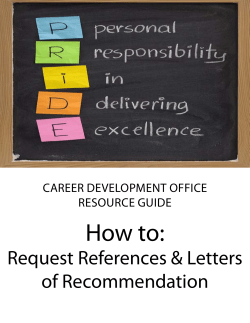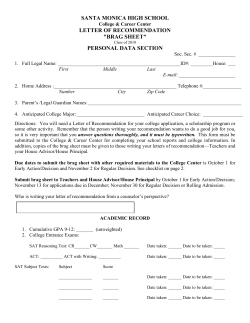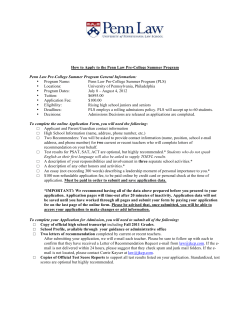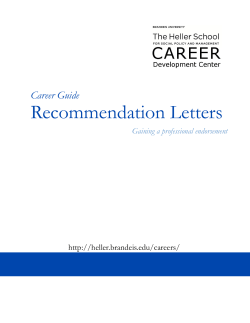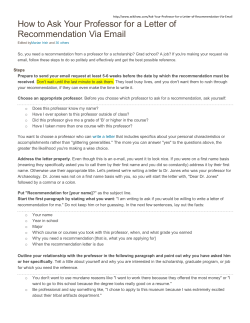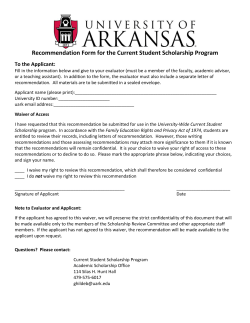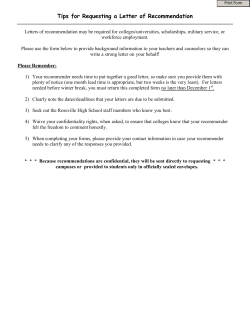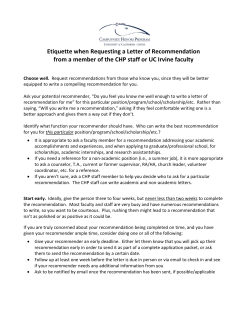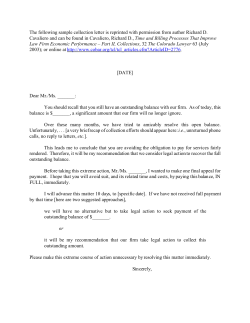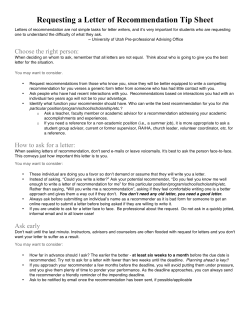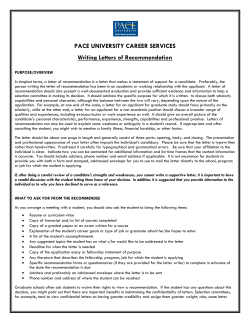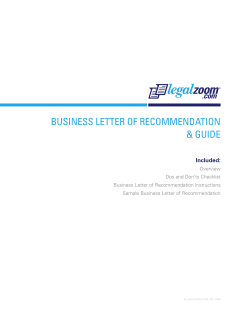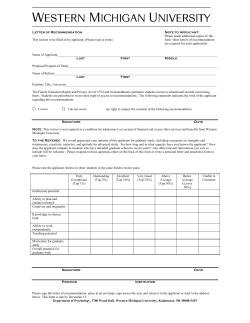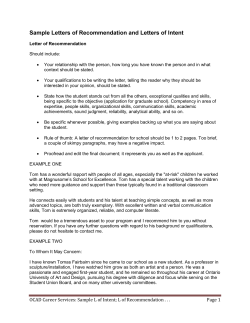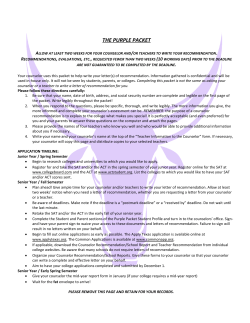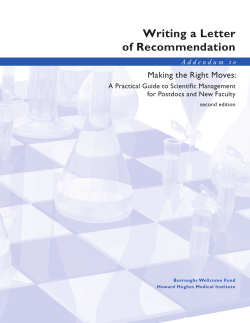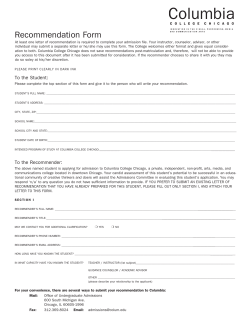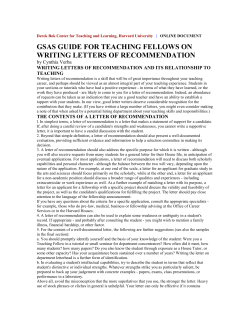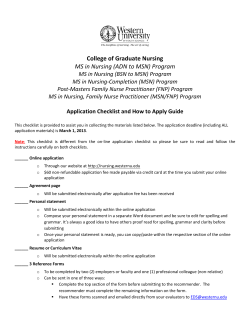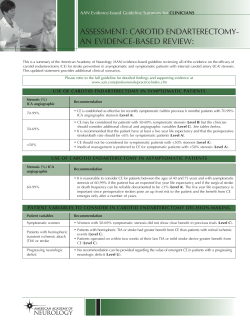
G S L R
GETTING STRONG LETTERS OF RECOMMENDATION A necessary step in applying to summer research opportunities or graduate school is obtaining letters of recommendation. Unfortunately, many students find the very prospect of asking a professor to write a letter of recommendation daunting. Don’t worry! This article will help you understand the process, get organized, and navigate the twists and turns of asking for a letter of recommendation. Remember, faculty expect a certain percentage of their students to ask them for letters of recommendation each year. Writing letters of recommendation is part of their job. Your job is to make it as easy as possible for them to write you a strong letter. Susanne Kauer Policy & Program Analyst in Student Affairs Office of the President, University of California Thanks to contributors Susanne Kauer, Scott D. Anderson and Michael Ernst. Also, parts adapted with permission from the UC Berkeley EECS Undergraduate Notes. Susanne Kauer is a Policy and Program Analyst in Student Affairs at the Office of the President at the University of California. Scott D. Anderson is a Lecturer in the Computer Science Department at Wellesley College. Michael Ernst is an Associate Professor in Computer Science and Engineering at the University of Washington. Why are letters of recommendation so important? First, letters of recommendation shed light on who you are as a person – most selection committees want to know something about your character from someone who knows you well! Second, university professors travel a lot and are tied into an international network of experts in their field. They know many of the faculty at other institutions, at least by reputation. One strong letter of support by a respected faculty member can do a tremendous amount of good for your application. With such a letter, you increase your chances of getting into your program or institution of choice – even if you do not have a perfect GPA. Tip: If you are graduating from an “Most selection committees want to interdisciplinary undergraduate program (e.g., marine know something about your science), your advisor may be willing to write a letter of character from someone who knows recommendation that highlights your “breadth of skills” you well. They might be interested in (and why this would help you in future research) in lieu your intellectual curiosity and zeal; of your honesty and integrity; your your “depth of skills” in one discipline only. responsibility and punctuality; your demeanor and personality . . . Whom should I ask to write me a letter? Professors or supervisors with whom you have worked closely in an academic setting, and who know you well, such as: www.pathwaystoscience.org contactus@ibparticipation.org Last updated 1/3/14 Professors who have had you in class, for whom you have done a project, or with whom you have done research. Your academic supervisor. Supervisors from internships related to your academic work. . . . As a faculty member, how would I know those things? Ideally, you and I had a oneon-one working relationship, say for an independent study or a research project. You might have visited me in office hours so that I got to know you more as an individual. You might have distinguished yourself in class or lab by the questions you asked or the comments you made.” Letters from these individuals are most effective because they come from people who have known Scott D. Anderson, Faculty you in an academic setting and whose academic standards are well established. But, you ask, what if I am a freshman or have never done internships/summer research? Choose a mentor, supervisor, or professor with whom you have had contact who can speak to your character and work ethic (remember to avoid relatives or family friends). See tips below on building relationships with professors or academic advisors. If you have an undergraduate research project that is supervised by a graduate student, make sure that any letters of recommendation submitted on your behalf are composed and signed by your faculty advisor, not the graduate student. And lastly, if you have not been in recent contact . . . consider: are they really your best reference? How can I make sure I get a good reference? First, select your references carefully! Choose references who know you well and can speak specifically to your work. Ask them: “Do you feel you can write me a strong letter of recommendation?” If they say yes, then make it as easy as possible for them to write you a strong letter: Give letter writers plenty of time! Once you have identified your recommenders, be sure to let them “As happy as I am to write letters of recommendation, they take time, know several months ahead of time, so they won’t which is always a scarce resource.” be surprised when you show up at their door Scott D. Anderson, Faculty seeking a letter of recommendation. Letter writers have other responsibilities and deadlines – give them enough time to do a good job for you. Summarize what you are applying for. Provide a full list of all the positions/programs you are seeking letters for, along with addresses and clear submission deadlines for each letter. First, a list makes clear the scope of what you are asking. It enables letter writers to plan, and they may prefer to send out all letters at once, rather than one at a time. Second, letter writers need to be able to tailor each letter to the individual opportunites you are applying to. Include in the list a brief description of each position/program to which you are applying. Provide a URL or flyer if appropriate. “Even if I know you well – my memory may fail me!’ www.pathwaystoscience.org contactus@ibparticipation.org Scott D. Anderson, Faculty Last updated 1/3/14 Help define your particular strengths. Prepare a packet of information for each of your recommenders. Include a draft of your statement of purpose, a list of courses you took with that professor and the grades you received, and your academic resume. Use PDFs, “For example, if you’d like to not Word (.doc) files. Your resume should list the emphasize your leadership ability, schools you have attended, courses you have remind me of the time that you taken, any research work you have done or volunteered to convene a panel related employment you have held, and a list of any honors you have received. These materials discussion on some topic. If you’d like to emphasize your research aptitude, provide the raw materials that can help shape a tell me that.” great letter – but don’t stop there! Specific Scott D. Anderson, Faculty examples and anecdotes are much more powerful than generic praise. So - remind recommenders of particular accomplishments or skills you’d like the letter to mention. Remind them of interactions you’ve had or experiences that may illustrate the qualities you’d like them to bring out in the letter. Remind them of any specific details that might be more appropriate for a letter of recommendation than in your personal statement or essays. Draw their attention to particular items on your resume or transcript that they might be able to speak to. Make the logistics easy. If electronic submission is available, let references know that up front! If the letters are to be mailed, provide a filled-out recommendation form, a preaddressed, stamped envelope, and any other necessary materials. Some writers will prefer to use the letterhead envelopes and posted provided by their University; others may appreciate the stamped envelope. It may also be possible to arrange to pick up your sealed letter directly from recommenders and then deliver it yourself; but some recommenders prefer to send letters directly to the selection committee. Ask what their preference is. “I prefer to write letters where you have waived your right to see it. I don’t intend to write Waive your right to view the letters of letters where I have negative things to say, but I recommendation. It’s traditional for letters to think the letter is taken more seriously when be sent directly to the entity evaluating the the selection committee knows that you are not reading it as well.” application; when that isn’t the case, the letter or evaluation will be sealed before Scott D. Anderson, Faculty being given to you. Don’t be paranoid about this; it is completely standard. Follow up to make sure the letters are sent and received. Email your references a week before the deadline. If you don’t get a response saying they’ve sent it, follow up again. A simple email can do it kindly and politely: “Hi Professor Smith, I just wanted to remind you that the letter of recommendation to Woods Hole Oceanographic Institute is due next Friday. The letter can be sent electronically as a PDF to reu@whoi.edu. Thanks!” Contact the admissions office receiving the letters to confirm that the letters arrived. www.pathwaystoscience.org contactus@ibparticipation.org Last updated 1/3/14 Lastly, say thank you. After you have completed the application process and have heard back on your acceptance, share the outcome with your recommenders. They care about you and will want to celebrate in your success! Or, if your application wasn’t successful this time, they will be able to help you plan for the next round. What if I am not applying right away? If you have built a strong academic relationship with a professor, supervisor or mentor, and you know that person would be able to write a strong letter of recommendation, you can always ask them to write you a letter now. They can keep the letter on file themselves; or some campus career advising centers offer the service of keeping letters of recommendation on file. Then, when the time comes, most of the hard work will have been done, and recommenders can easily re-work the What if I Don’t Know Any Professors Very Well? letter to bring it up to date or make it specific to the current opportunity for Unfortunately, undergraduate classes at many which you are applying. Make an institutions tend to be large, and many professors effort to stay in touch with your do not get to know all of their students well. So what should you do? Plan ahead. Plan on creating recommenders by email, so that they one-on-one academic relationships where someone can write you an up-to-date letter of can get to know you and your work well. recommendation when the time comes! There is great value to If you particularly enjoy one of your courses, or if maintaining relationships with your you know you are doing particularly well in a supporters. course, be sure the professor knows you. Attend office hours, even if you do not need help. Demonstrate your enthusiasm by inquiring about research opportunities. Tell you professor about your summer research or graduate school ambitions. Be involved in opportunities that your professor is hosting outside of class, such as brownbag lunches or evening speaker seminars. A few final words: Just remember, many students before you have felt intimidated about asking for letters of recommendation, and they are now in graduate school! Some of them are even faculty members. Chances are that if you are considering applying to a summer research opportunity or to graduate school, you are exactly the type of student a professor would be proud to recommend. Susanne Kauer Policy & Program Analyst in Student Affairs Office of the President, University of California For more information visit www.pathwaystoscience.org or contact the Institute for Broadening Participation at contactus@ibparticipation.org. www.pathwaystoscience.org contactus@ibparticipation.org Last updated 1/3/14
© Copyright 2025
